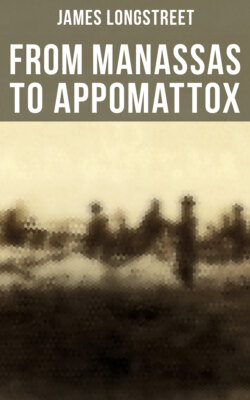Читать книгу From Manassas to Appomattox - James Longstreet - Страница 4
На сайте Литреса книга снята с продажи.
Preface
ОглавлениеTable of Contents
Immediately after the surrender of the Confederate armies engaged in the war between the States, General Lee undertook to write of the campaigns of the Army of Northern Virginia while under his command, and asked such assistance as I could give in supplying reports, despatches, and letters of his, the originals of which had been lost or destroyed. Under the impression that they could not be put to better use, such as were then in hand were packed and sent him. He gave up the work, and after a few years his death made it impossible that the world should ever receive the complete story of the Confederate campaigns in Virginia from the noble mind that projected and controlled them.
Possibly, had I not expected our commander to write the history of those campaigns, I should have written it myself a decade or so earlier than I have done. But, personally, I am not sorry that I write of the war thirty years after its close, instead of ten or twenty.
While I am so constituted, temperamentally, that I could view then almost exactly as I do now the great struggle in which I bore a part, I do not know that others, in any considerable number, might have so regarded it at the earlier periods to which I refer.
I believe that now, more fully than then, the public is ready to receive, in the spirit in which it is written, the story which I present.
It is not my purpose to philosophize upon the war, but I cannot refrain from expressing my profound thankfulness that Providence has spared me to such time as I can see the asperities of the great conflict softened, its passions entering upon the sleep of oblivion, only its nobler—if less immediate—results springing into virile and vast life. I believe there is to-day, because of the war, a broader and deeper patriotism in all Americans; that patriotism throbs the heart and pulses the being as ardently of the South Carolinian as of the Massachusetts Puritan; that the Liberty Bell, even now, as I write, on its Southern pilgrimage, will be as reverently received and as devotedly loved in Atlanta and Charleston as in Philadelphia and Boston. And to stimulate and evolve this noble sentiment all the more, what we need is the resumption of fraternity, the hearty restoration and cordial cultivation of neighborly, brotherly relations, faith in Jehovah, and respect for each other; and God grant that the happy vision that delighted the soul of the sweet singer of Israel may rest like a benediction upon the North and the South, upon the Blue and the Gray.
The spirit in which this work has been conceived, and in which I have conscientiously labored to carry it out, is one of sincerity and fairness. As an actor in, and an eyewitness of, the events of 1861-65, I have endeavored to perform my humble share of duty in passing the materials of history to those who may give them place in the records of the nation,—not of the South nor of the North,—but in the history of the United Nation. It is with such magnified view of the responsibility of saying the truth that I have written.
I yield to no one as a champion of the Southern soldier wherever he may have fought and in whatever army, and I do not think I shall be charged more now than in war-time with “underestimating the enemy.” Honor to all! If I speak with some particularity of the First Corps of the Army of Northern Virginia, it must be ascribed in part to the affection of a commander, and in part to my desire to relieve its brave officers and men in the ranks from unjust aspersions. After General Lee’s death, various writers on the Southern cause combined with one accord to hold the First Corps and its commander responsible for all adversity that befell the army. I being under the political ban, and the political passions and prejudices of the times running high, they had no difficulty in spreading their misrepresentations South and North until some people, through their mere reiteration, came to accept them as facts. I simply present the facts concerning the First Corps in all fulness and fairness, attested by indisputable authorities, that the public may judge between it and its detractors.
In the accounts of battles and movements, the official War Records supply in a measure the place of lost papers, and afford a great mass of most trustworthy statistics. I am under obligations to General E. P. Alexander, General G. M. Sorrel, Colonel Osman Latrobe, Colonel J. W. Fairfax, Colonel T. J. Goree, Colonel Erasmus Taylor, and Colonel J. C. Haskell for many interesting suggestions.
To Major George B. Davis and Mr. L. J. Perry, of the War Records office, I am under obligations for invaluable assistance; as also to Mr. Alfred Matthews, of Philadelphia, for material aid in revising the manuscript of these memoirs.
The Author.
